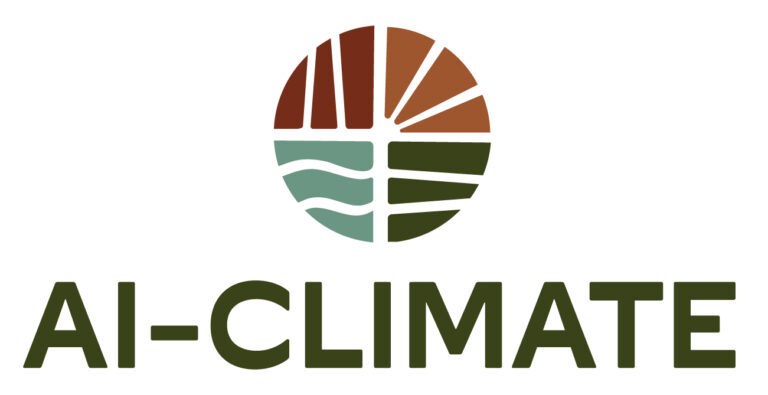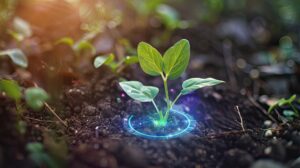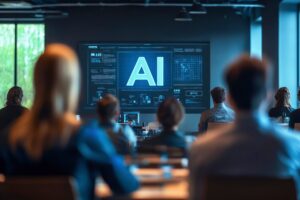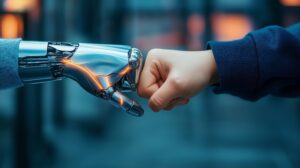On “Integrating AI Education Through Food Systems and Climate Change Curriculum”

AIVO recently caught up with Natalie McCaffery, MS student and Graduate Research Assistant in the Department of Soil and Crop Sciences at Colorado State University. We talked about her work with the AI Institute for Climate-Land Interactions, Mitigation, Adaptation, Tradeoffs and Economy (AI-CLIMATE).*
*Note: AI-CLIMATE is now AI-LEAF.
Check out this excerpt from our interview:
AIVO: Natalie, you recently presented preliminary findings of your current project with AI-CLIMATE at Colorado State University’s annual GradShowcase, and your presentation, “Integrating AI Education Through Food Systems and Climate Change Curriculum,” received “Top Scholar of the College of Agricultural Science.” Congratulations!
What prompted you to delve into this research area?
Natalie: It’s been a progression of all my education and experiences. I had a middle school teacher with an interest in food systems and agriculture, who introduced me to the field. I was in Girl Scouts for 12 years and completed my Girl Scout Gold Award, in which I developed a nonprofit to create opportunities in the classroom to combine Food & Agriculture with STEM. And in high school, I was a part of a student research program where I had flexibility to explore Agritech and started attending applicable conferences to expose myself to the Food & Ag industry.
I’ve had many valuable mentors over the years! When I started in agriculture, I had no farming background. During my bachelor’s degree at Washington & Lee University (Lexington, VA), I majored in geology yet supplemented my degree with courses adjacent to the food and Ag industry. Relationships with professors and community members, including farmers, fueled my undergraduate opportunities to gain further exposure, especially to soil science.
I’m able to design my own curriculum in my master’s program, so I’m filling in what’s missing in my skill set, such as a knowledge of process-based modeling of ecosystems, nutrient cycles, and greenhouse gas accounting. I credit my advisor, Keith Paustian,* and subproject co-lead, Emma Eckley, at Colorado State, for encouraging me to combine my past experiences in this AI-CLIMATE project.
*Keith Paustian is Co-PI for AI-CLIMATE.
AIVO: Can you give us some details about your research? What is the ultimate goal of your project?
Natalie: I love this project! I’m very excited to develop and implement a high school curriculum on climate science, introducing the use of AI tools.
I’m building learning modules, with 4-H, Future Farmers of America (FFA), and Girl Scouts in mind as target audiences. We’ve solidified that work with 4-H and we’re in process with FFA and the Girl Scouts.
My project with the Education and Workforce Development group (EWD) in AI-CLIMATE started with a land use and demographic survey to understand the profiles of counties and the student-facing policy affected (13–19 year-old students). We analyzed the effectiveness to inform our approach of implementing their curriculum. We want a novel approach/curriculum for the next generation of workers, and we want to leverage existing work in this space.
I’ll wrap up by the end of this semester and then start implementing by the start of the next academic year. There are more updates to come.
AIVO: What’s the role of AI-CLIMATE in your project? How do you work with their team to move your project forward?
Natalie: They’re showing me how “Big Science” gets carried out. I work closely with the EWD team, including weekly meetings and interfacing with the advisory committee within the EWD. My technical research for the thesis of my master’s degree is more in line with other aspects of AI-CLIMATE. However, being involved in the EWD group has been a great experience to learn about the Institute’s mission as a whole.
AIVO: How did you find out about the opportunity to have a project with AI-CLIMATE?
Natalie: My advisor, Keith Paustian, brought me onto the project!
I had past experience with on-farm studies, and I am working with process-based modeling during my MS in Soil & Crop Sciences. Keith is a leader in that space, and AI-CLIMATE has an integrative approach to supporting rural economies through the application of AI in agricultural production and land management. They have a well-established group of scientists, connections, and a great framework, especially in how the Institute is run. I was eager to learn how to run a project at that scale.
AIVO: You’re studying soil and crop science. What are some ways you plan to use your master’s degree after you graduate?
Natalie: I hope to pursue a PhD, maybe a joint program (e.g., JD-PhD). I’m considering data analytics and the applied statistics fields. Going forward, I plan to still be in agricultural science, science communications, policy, or industry. I’d like to be involved in the Ag space by affecting food systems and climate science. I want to do work that rewards farmers for their practices and supports a growing population.
AIVO: Is there anything you’d like to add that we haven’t covered in the interview yet?
Natalie: While I’m working on a state-specific approach covering six states, it would be great to have nationwide collaboration and apply our work to other states!
A heartfelt thank you to Natalie for taking time out to talk with us! Congratulations on your project, “Integrating AI Education Through Food Systems and Climate Change Curriculum.” We know you’ll do great things in your career!
AI-CLIMATE’s Graduate Student Activities
AI-CLIMATE offers education, mentorship, and professional development opportunities for graduate students. Through events like open houses, monthly seminars, and collaborative team meetings, graduate students can engage with the Institute to help build professional networks, gain hands-on research experience, and explore career opportunities in AI and climate science. Graduate students also participate in journal clubs and work closely with AI and Climate-Smart Agriculture and Forestry (CSAF) scientists to stay updated on cutting-edge research at AI-CLIMATE.
Learn about all of AI-CLIMATE’s education and workforce development projects on the AI-CLIMATE website.




